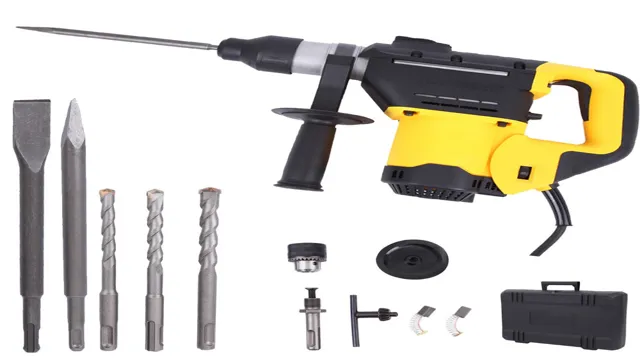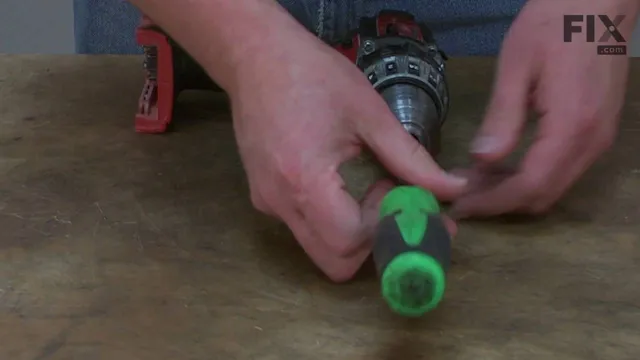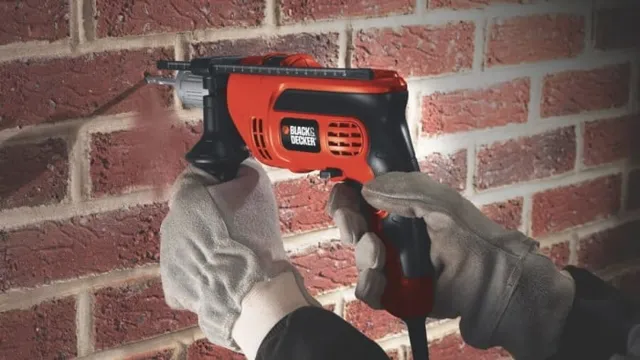Are Hammer Drill Bits Different than Regular Drill Bits in Function and Features?
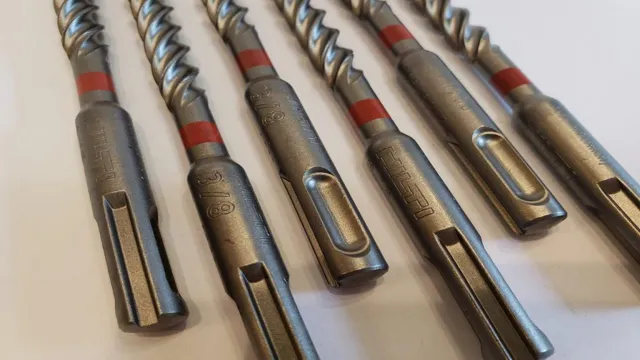
Have you ever found yourself questioning the difference between hammer drill bits and regular drill bits? Whether you’re a DIY enthusiast or a professional contractor, it’s essential to know what sets these two types of drill bits apart from each other. While they may look similar at first glance, the truth is that hammer drill bits are specifically designed for heavy-duty drilling on tough materials such as concrete and masonry. In fact, attempting to use regular drill bits on these materials can cause significant damage to both the bit and the machine itself.
So, if you’re planning on drilling into these tougher materials, read on to learn more about the distinct characteristics of hammer drill bits and how they differ from your typical drill bits.
Understanding Hammer Drill Bits
Yes, hammer drill bits are different from regular drill bits. Hammer drill bits are designed to withstand the high-impact force generated by a hammer drill. They have a special tip that is shaped like a chisel to help break through tough materials like concrete, brick, and stone.
The tip is also made with hardened steel to resist wear and tear. Additionally, the body of a hammer drill bit is thicker than a regular drill bit to withstand the additional stress placed on it during use. It’s important to use the correct type of hammer drill bit for the job to ensure safety and efficiency.
Using the wrong bit could result in damage to the bit, drill, or work surface, and could even cause injury. So, always check the manufacturer’s recommendations before choosing a hammer drill bit for your project.
What are hammer drill bits?
Hammer drill bits are designed specifically for use with hammer drills, which are power tools that combine rotary motion with a hammering action that helps them penetrate tough materials like concrete, brick, and stone. These bits differ from regular drill bits in a few ways, including their shape, the type of tip they have, and the materials they are made from. For example, hammer drill bits usually have a fluted design that helps them expel the dust and debris that gets created when drilling into solid surfaces.
They also often have a carbide tip, which is a material that is known for its hardness and durability. This tip is able to withstand the punishing pounding of the hammer drill’s percussion mechanism, helping the bit to maintain a sharp edge and prevent it from dulling too quickly. All of these features work together to make hammer drill bits an essential tool for anyone working in the construction, renovation, or demolition industries.
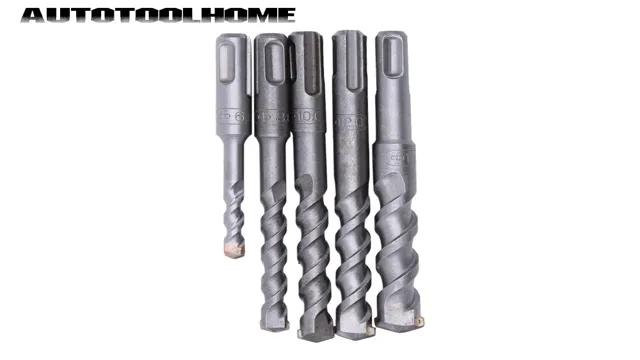
How do they differ from regular drill bits?
Hammer drill bits, also known as masonry bits, differ from regular drill bits because of their design and material. Hammer drill bits are made of stronger metal and have a carbide tip that can withstand the pressure that comes with drilling into hard surfaces like concrete, brick, and stone. Regular drill bits are not designed for this type of work and can quickly wear out or break under the same pressure.
Hammer drill bits also have a unique flute design that helps to remove debris while drilling, preventing overheating and allowing for a faster and more efficient drilling process. Additionally, hammer drill bits have a special shank that allows them to fit securely into the chuck of a hammer drill, ensuring stability during operation. Whether you’re a professional contractor or a DIY enthusiast, understanding the differences between hammer drill bits and regular drill bits is crucial in achieving successful and accurate drilling results.
Types of Hammer Drill Bits
Hammer drill bits are, in fact, different from regular drill bits as they are designed to withstand the high impact of a hammer drill. There are a few different types of hammer drill bits, each designed for specific applications. The most common type is the masonry bit which is used for drilling into concrete, brick, and other masonry materials.
These bits have a tungsten carbide tip which can handle the high speeds and pressure of a hammer drill. Another type of hammer drill bit is the wood bit which, as the name suggests, is used for drilling into wood. These bits have a sharper point than masonry bits and are made from high-speed steel or titanium.
Finally, there are metal bits which are used for drilling into metals such as steel or aluminum. These bits have a unique shape that allows them to penetrate metal easily. Overall, hammer drill bits are specifically designed to withstand the high impact of a hammer drill and come in different shapes and sizes depending on the material being drilled.
Masonry bits
Masonry bits are essential tools for drilling through brick walls, concrete, stonework and other hard materials. Hammer drill bits are typically used with a hammer drill, which provides the extra force needed to penetrate tough surfaces. There are several types of masonry bits available, each designed for a specific drilling application.
For instance, carbide-tipped bits are best suited for drilling through hard materials such as concrete, while diamond-tipped bits are better suited for drilling through tile and other brittle materials. Masonry bits come in various sizes and shapes, including round, hexagonal, and square, to accommodate different drilling needs. Regardless of the type of masonry bit you use, it’s important to choose the right size, maintain a steady hand, and apply consistent pressure when drilling to avoid damaging the bit or the material being drilled.
So if you’re planning to drill through masonry, make sure to choose the right hammer drill bit for the job and use it carefully to achieve the best results.
Carbide-tipped bits
When it comes to hammer drill bits, there are different types to choose from depending on the job you need to do. One of the most common types is the carbide-tipped bit. This type of bit is made from a mixture of tungsten carbide and cobalt, providing it with high strength and durability.
These bits are ideal for drilling through hard materials such as concrete, brick, and stone. The tungsten carbide tip is designed to withstand heavy use and can stay sharp for a long time, making it an excellent investment for professionals and DIY enthusiasts alike. With carbide-tipped hammer drill bits, you can expect precision and efficiency, making any drilling project easier and faster.
Diamond-coated bits
If you are in the construction or woodworking industry, choosing the right type of hammer drill bit can make a world of difference in the quality and efficiency of your work. There are various types of hammer drill bits available, each with its unique features and capabilities. One such type is diamond-coated bits, which are designed to handle tough materials such as tiles, granite, and concrete.
As the name suggests, these drill bits are coated with diamond particles for added strength and durability. They also offer faster drilling speeds and last longer than traditional bits, making them an excellent investment for those who frequently work with hard materials. Whether you’re a DIYer or a professional, diamond-coated hammer drill bits are a perfect option to achieve accurate and clean holes in even the toughest surfaces.
Factors to Consider When Choosing Hammer Drill Bits
Yes, hammer drill bits are different from regular drill bits in terms of design and purpose. When choosing hammer drill bits, there are several factors to consider. First, consider the material the bit is made of, as this can affect its durability and ability to withstand high-speed rotations and repetitive hammer blows.
Second, take into account the size and shape of the bit, as this will determine how well it can bore into different materials with precision. Third, think about the type of shank and whether it’s compatible with your drill, as a proper fit can improve accuracy and prevent wobbling or slipping. Finally, consider the overall cost and value of the hammer drill bit, as higher-priced options may offer more durability and longevity.
By taking these factors into account, you can choose the right hammer drill bit for your specific drilling needs.
Material you’re drilling
When it comes to choosing hammer drill bits, one of the most important factors to consider is the material you’ll be drilling into. Different materials require different types of drill bits, so it’s essential to choose the right one for the job to avoid damaging the drill or the material. For example, if you’re drilling into concrete or masonry, you’ll need a masonry bit with a carbide tip.
On the other hand, if you’re working with wood, you’ll want a wood drill bit with a sharp point to avoid splintering. Meanwhile, drilling into metal requires a high-speed steel bit, and drilling into tiles requires a diamond-tipped bit. Understanding the material you’ll be drilling into ensures that you select the appropriate hammer drill bit for the job, resulting in a better outcome and a more efficient process.
The size of the hole you need
When it comes to choosing hammer drill bits, the size of the hole you need is one of the primary factors you have to consider. Different projects might require different hole sizes, and you want to ensure you have the right bit for the job. Your drill will specify the maximum capacity of the drill bits it can handle, so make sure you choose the right size for your drill.
Additionally, you’ll want to pay attention to the length and diameter of the bit. Longer bits are better for deeper holes, while larger diameters are better for larger holes. Remember that the material you’re drilling into can also affect the size of the hole you need.
For instance, you might need a larger bit if you’re drilling into wood than if you’re drilling into concrete. By considering all these factors, you can choose the right hammer drill bit for your project and ensure its success.
Conclusion
In conclusion, asking whether hammer drill bits are different is like asking whether a hammer is different from a regular old rock you found on the ground. Sure, they may both be able to accomplish similar tasks, but one has been specifically designed and crafted to perform the task more efficiently and effectively. With their unique fluting patterns, carbide tips, and special heat treatments, hammer drill bits are in a league of their own when it comes to drilling through tough materials like concrete and masonry.
So next time you’re embarking on a DIY project that involves heavy-duty drilling, make sure to invest in some high-quality hammer drill bits – your arms (and your sanity) will thank you!”
FAQs
What is a hammer drill bit?
A hammer drill bit is a tool used for drilling into hard surfaces such as concrete, brick, and stone.
What makes a hammer drill bit different from a regular drill bit?
Hammer drill bits have a special tip that allows them to penetrate hard materials while also providing a hammering or pounding action.
Can you use a regular drill bit in place of a hammer drill bit?
No, regular drill bits are not designed to withstand the force required to drill into hard surfaces like concrete and brick.
What size hammer drill bit should I use for a specific project?
The size of the hammer drill bit depends on the diameter of the hole you need to drill. It’s important to use the correct size to ensure proper drilling and anchoring.
Should I use a carbide-tipped hammer drill bit or a diamond-tipped hammer drill bit?
Carbide-tipped hammer drill bits are suitable for most general-purpose drilling applications, while diamond-tipped hammer drill bits are better for drilling extremely hard surfaces like granite and reinforced concrete.
How do I know if my hammer drill bit is dull and needs to be replaced?
Signs that your hammer drill bit is dull and needs to be replaced include reduced drilling speed and increased resistance to drilling.
How do I properly store my hammer drill bits to extend their lifespan?
Store your hammer drill bits in a cool, dry place away from moisture and abrasive materials. Protect them from impact or dropping to prevent damage.

